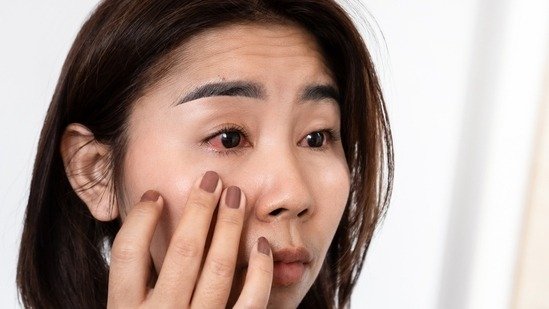From dry eyes to glaucoma, know how hormonal fluctuations can affect your eyes.

Hormones can affect eye health.
Hormones play a significant role in the functioning of each and every organ of the body. However, the same hormones can affect eye health. In an interview with HT lifestyle, Dr. Archana L, Consultant Ophthalmologist, Dr Agarwals Eye Hospital, Bengaluru said, “At the eye level, hormones influence the regulation of the blood retinal barrier, neuroprotevtion, vascular regulation and modification of intraocular pressure vales. There are specific receptors for hormones like estrogen, progesterone and thyroid hormones in the lacrimal glands, Meibomian glands, extraocular muscles, conjunctiva, ciliary body, choroid etc.”
1. Dry eye disease:
Estrogens and androgens like testosterone have a crucial role to play in function of meibomian glands, lipogenesis and maturation of acinar cells of the lacrimal glands. Menopause is also associated with reduced estrogen and androgen levels. Hence there is a high risk of evaporative dry eye disease due to dysfunction of meibomian glands.
2. Inflammation:
In the follicular stage of the menstrual cycle, high estrogen levels have a competitive link on the androgen receptors of the meibomian glands and lacrimal glands and has a pro inflammatory effect on tear production, thus leading to dry eyes.
3. Corneal disorders:
Structural changes in the form of change in central corneal thickness and curvature are noted during pregnancy, menstrual cycles and in women on oral contraceptive pills/hormonal therapies. These can lead to visual disturbances and changes in intraocular pressure.

Hormonal fluctuations can impact eyes severely.(freepik )
4. Cataract:
Estrogen has an antioxidant protective effect on lens opacification. Hence after menopause, there is increased incidence of cataract in women.
5. Glaucoma:
Estrogen has a protective effect on retina ganglion cells; it prevents thinning of RNFL and contributes to lowering of IOP. Hence post-menopausal women with lower estrogen levels have a higher risk of raised intraocular pressure and damage to optic nerve.
6. Macular degeneration:
Hormones like estrogen, progesterone and androgens, due to the ani inflammatory and immunomodulating effects have protective benefits on age related macular degeneration, optic neuritis due to multiple sclerosis, central serous retinopathy etc.
7. Disturbances in vision:
Abnormal production of thyroid hormones can lead to visual disturbances, bulging of eyeballs due to muscle hypertrophy, double vision etc. It can also lead to increase incidence of ARMD.




















